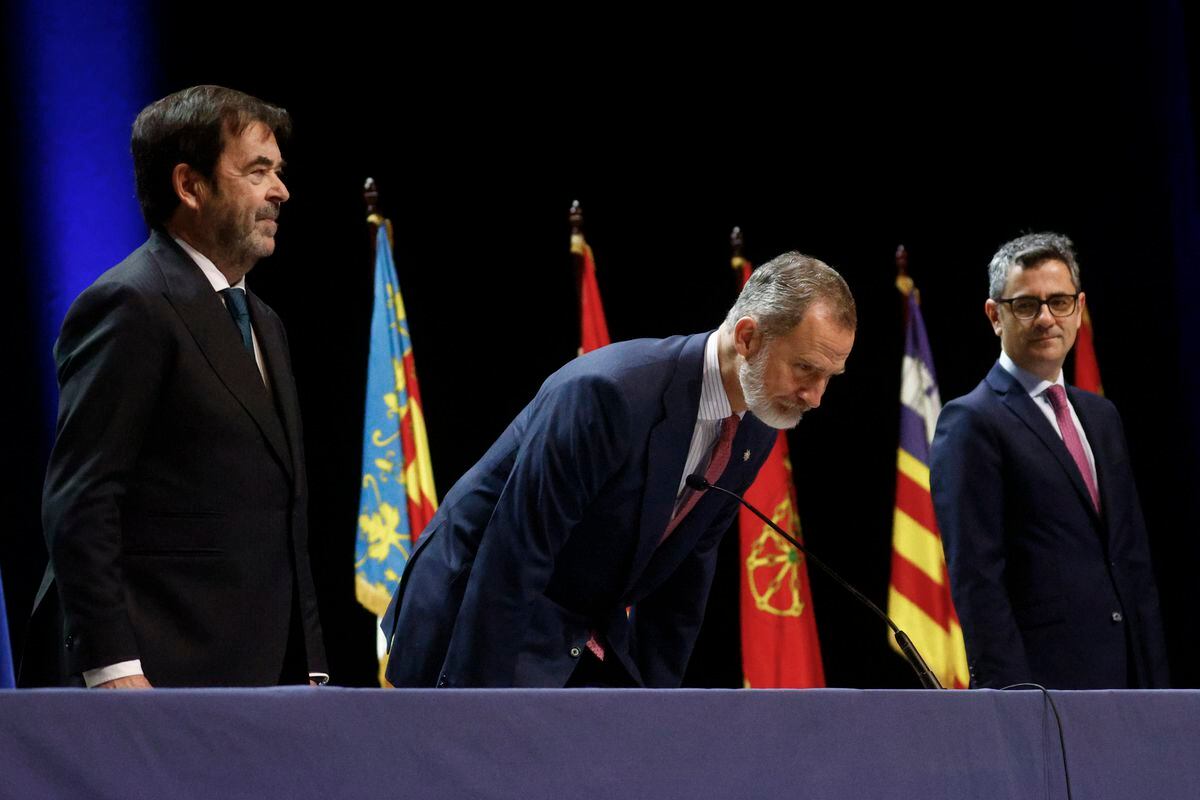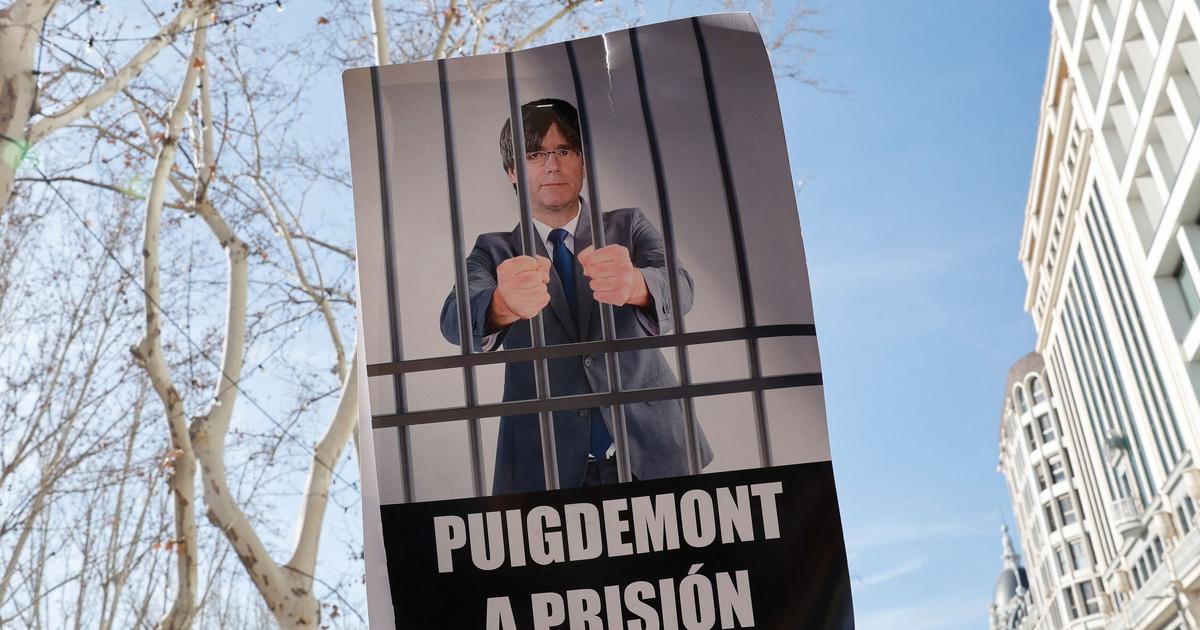The leaders of the PSOE and the Esquerra Republicana de Catalunya (ERC) had spoken about it many times since the difficult negotiations for the investiture of Pedro Sánchez, at Christmas 2020, which were about to derail.
There was agreement on the substance but not on the form, which was decisive.
Until Thursday, when the president announced that the crime of sedition, punishable by up to 15 years in prison, would be replaced by that of aggravated public disorder, with a maximum penalty of five.
The Socialists accepted from the beginning, and Sánchez promised in January 2020, shortly after being sworn in as president, that the Penal Code had to be changed to “harmonize Europe” with the crime of sedition.
But he had no agreement on how to do it.
Initially, ERC wanted the total elimination of sedition, a kind of amnesty for the
procés
leaders whom the Supreme Court convicted of this crime.
The PSOE insisted that the State could not be left unprotected, and that what happened in 2017 in Catalonia —the process that led to the holding of an illegal referendum and the unilateral declaration of independence— should be a crime, although with penalties of less than the 15 years of the current Penal Code, much higher than in other large European countries.
Thus the months passed, with the reform like a Guadiana that appeared and disappeared without ever materializing.
And the pardons arrived, which solved part of the problem.
But not all.
Along this path, relations between the Government and ERC suffered very strong ups and downs.
The Republicans were on the verge of overthrowing the labor reform, which came about miraculously due to a mistake by the PP.
After the Pegasus espionage scandal, ERC fell out of the majority for several weeks.
The Government had a hard time, but managed to survive and win votes even without the Republicans.
The Executive resolved the
Pegasus case
with drastic decisions, especially the dismissal of the head of the secret service, the CNI, Paz Esteban, after admitting espionage to
President
Pere Aragonès.
Sánchez and the head of the Government approached each other again at their meeting in July this year, which was decisive.
There it was clear that ERC wanted to recover the sedition reform.
The Republicans, by then almost on the verge of breaking with Junts, needed to show that the dialogue table was useful for something.
They wanted visible results.
And changing sedition is.
In addition, they have concrete problems.
Its general secretary, Marta Rovira, has been on the run for five years in Switzerland.
She requires a horizon to return that is not that of a sentence of up to 15 years.
Other lesser-known charges from the hard core of ERC and from the environment of Oriol Junqueras also face complicated processes.
The reform also benefits Carles Puigdemont, but less so, because he, unlike Rovira, is also accused of embezzlement.
The
former president
, even with the reform, would face many years in prison if he were to return to Spain from Belgium, where he fled.
The Republicans now hope to convince the PSOE to also tweak the embezzlement in the amendment phase in Congress.
But the only sure thing now is the change of the crime of sedition.
Embezzlement is much more delicate, because it directly affects cases of corruption.
In La Moncloa, Sánchez and Aragonès discussed the possibility of new budgets and agreed that the dialogue table would meet again on July 27.
Then it was agreed that the advances should be ready before the end of the year.
But the reform of sedition did not materialize, only of a generic need to "overcome the judicialization", which each one could interpret in his own way.
Why?
According to sources from both sectors, because the ERC still did not accept the idea that there had to be a penalty for the crimes of the
procés
, even if it was with another classification, as happens in most European countries.
Pressure with the support of the Budgets
To pressure, ERC began to spread an idea in September that the Government was very concerned about: if it wants the Budgets, it will have to give in on the reform of the Penal Code.
In October there was one of the most difficult moments.
The team of Félix Bolaños, the main socialist negotiator, transfers a clear idea to ERC: if you link Budgets and sedition, there is nothing to do.
The Government was in a very delicate situation.
With the ERC he spoke of public accounts and sedition, as issues that he wanted to separate, while with the PP he negotiated the renewal of the General Council of the Judiciary.
Bolaños insisted to the popular Esteban González Pons that there was nothing new with the sedition at that time.
The Executive ensures that it was so, because ERC still did not accept that there were crimes in the
procés
and they should have penalties similar to those of the rest of Europe.
At that time the Government was thinking of a maximum sentence of six years.
Aragonès assured on October 13 that there was an "exchange of roles" with the Government on sedition, but in the Executive they insist that there was no progress because the Republicans still wanted to eliminate the crime without further ado.
That week the PSOE managed to get the ERC to admit publicly separating the negotiation of the sedition and the Budgets.
On October 21, the Republicans agreed not to introduce an amendment to the whole and in their public explanation did not say a word about the sedition.
ERC only spoke of "generating the necessary conditions of trust to keep the ongoing negotiations alive."
A cryptic message that avoided mentioning the reform.
That same day, from Brussels, Sánchez assured that he was willing to modify the sedition and that it was an investiture and “personal” commitment that he wanted to fulfill, but that he still did not have a majority in Congress to do so.
It was a clear message to ERC: if you accept that there must be a crime and stop asking for removal without further ado, we can do it.
Sánchez and her team maintained permanent contact with Yolanda Díaz and her team.
United We Can, with Jaume Asens at the helm in this matter, always opted for reforming the Penal Code to finish off the normalization operation started with the pardons.
The negotiation with the PP was then complicated precisely because of the sedition, although previously the popular party had said that they were different issues.
On October 27, Alberto Núñez Feijóo demanded that Sánchez undertake not to reform the crime, and the president answered him emphatically that he intended to change it if there was a majority, that he had the right to do so like any government that obtains the support of Congress to modify a law and that he could not accept the "blackmail" of demanding not to touch a law in exchange for fulfilling the constitutional obligation to renew the Judicial Power.
That was the key moment, both parties agree, that precipitated everything.
That night of Thursday the 27th, the Republicans feared that the PSOE would back down with the sedition.
But the effect was the opposite.
The Socialists were more determined than ever.
And the Republicans turned.
For the first time, that weekend they began to send papers in which it was assumed that there could be crimes and penalties, although different from sedition.
Fast processing
In the first versions, the distance between ERC and the Government was important: the Republicans proposed a sentence of six months to three years, as in countries with a softer regime, and the Socialists a punishment of four to six years, in the European high stripe.
An express negotiation was launched.
For the PSOE, once the agreement with the PP had been broken, it was essential to go quickly, in order to carry out a process at full speed in Congress and prevent the controversy from continuing until the run-up to the municipal and regional elections.
In 10 days the agreement was ready.
On Wednesday it was practically closed.
On Thursday the final touches were made.
Not three years, not six: the maximum sentence would be five.
Specifically: between three and five, with this new crime of aggravated public disorder.
For ERC, the great victory is that the crime of sedition is eliminated, not simply reducing the penalty, as was proposed at the beginning.
For the Government, the great success is that ERC approves a text that implicitly recognizes possible crimes of aggravated public disorder by its leaders.
In the Executive they insist that they have preserved a red line: not to unprotect the State against behaviors such as that of the procés.
They will continue to be a crime, although softer.
And to punish a more serious conduct, such as brandishing weapons, follows the crime of rebellion in the Penal Code.
In the PSOE they insist that great care has been taken in the wording in line with the Supreme Court ruling in the
procés
trial .
Socialist sources point out that judges of said court already privately requested a reform of the crime of sedition because it had become clear that it did not meet the needs of a modern society.
And they insist that the wording of the new crime of aggravated public disorder has been based on the concepts of "public peace" and "public order" as described in the procés sentence.
There are many legal discussions behind it, and there will be much debate about the technical consequences of the reform.
But the fundamental argument of the PSOE is not legal, but political: this reform completes the process of normalization begun with the pardons.
Eliminate the argument of pro-independence victimhood.
Close to those who, like Junts, insist on betting on the breakup.
And it allows Catalonia to continue calming down.
02:18
Patxi López announces the reduction of the crime of sedition from 15 to 5 years
Jaume Asens from Unidas Podemos and Patxi López from the PSOE arrive at the general register in the Congress of Deputies in Madrid.Photo: ANDREA COMAS
Socialists know that there is a risk of strong attrition.
"The PSOE engages in politics even if it costs it votes: it would be treason not to try," summarized the parliamentary spokesman, Patxi López.
Some barons are worried.
But others point out that many citizens will see that Sánchez has managed to stop Catalonia from being a problem.
“People have other problems and will vote in June for other keys.
This matter in the CIS has almost disappeared, it has moved to number 41 [of concerns].
Everyone sees that Catalonia is better now, it is no longer a real problem for anyone.
The result is that the independence movement is divided and there is no longer an imminent risk of another procés”, summarizes one of them.
Meanwhile, ERC is facing criticism from Junts on the grounds that clear progress has been made thanks to its negotiating policy with the Socialists.
The commitment to dialogue has its second great milestone after the pardons.
In Catalonia, the polls clearly indicate that the citizens are in favor and reward those who have defended this path.
Now it remains to be seen what real effect it has on the rest of Spain.
Subscribe to continue reading
read without limits
Keep reading
I'm already a subscriber


/cloudfront-eu-central-1.images.arcpublishing.com/prisa/WXWUA7CAWZGZHKO26CZYXXWMEE.jpg)

/cloudfront-eu-central-1.images.arcpublishing.com/prisa/3GRMM6OV45ND3OEGLDRTEXKOVU.jpg)




/cloudfront-eu-central-1.images.arcpublishing.com/prisa/OCXVGAGDFFE6NDRQIKWRK26LLU.jpg)